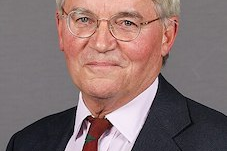Sunday Reflection with Fr Terry - 1 January 2012
Not long ago we were singing one of the best-known Christmas hymns, 'O Come All Ye Faithful'. It is a favourite at carol services. Yet these days we may find ourselves a little uncomfortable when we come to the line, 'Lo, he abhors not the Virgin's womb.' Feminism has made us more aware of prejudices against women. Why, we may wonder, should the infant Jesus ever abhor Mary's womb? The original Latin does not contain any negative connotations, referring simply to being borne in the womb of a young girl. So this use of the word abhor is well, abhorrent, because it seems to imply distaste. Of course, we are bringing the sensitivities of our present age to bear on an earlier era which had a rather different agenda. And yet in this hesitation of ours can lead us into a deeper understanding of what God does for us in Christ.
Almost from the very first stages of thinking about the incarnation there was concern to protect the understanding of Christ as both God and man. In particular, theologians wanted to make it clear that Jesus was not some good human being who was taken over, so to speak, by God. To put it bluntly, we cannot be saved by a good bloke, no matter how good. Only God can sweep away human sin, and rescue us from our follies. Jesus who is Christ is the one who can do this, because from his very inception he is both divine and human, God and man. For this reason the early Church gave Mary the title Theotokos or God-bearer at the Council of Ephesus in 431. Mary was the mother not only of the human Jesus, but of God among us.
This should give us pause for thought. It brings home the divine humility shown in the one who, although Lord of Lords and King of Kings, yet is prepared to be a child for our sake. In every age the hymn-writers and Christian thinkers have responded with delight at this wonderful evidence of God's love of us. The Gospel according to John tells us that this is the one who was there at the very creation of the world, 'without him was not anything made that was made'. And yet, this co-creator becomes a creature himself, nestling in the womb of Mary. The second preface we use at Christmas hints at this when it says that 'begotten before all ages, he has begun to exist in time'.
As another much-loved carol reminds us, 'He came down to earth from heaven/Who is God and Lord of all.' Mary's title as Mother of God safeguards and protects this insight, just as she safeguarded and protected the divine child that she brought into the world. Naturally we venerate the one who was given this privilege.
What does it mean for us in our daily living that Mary is the Mother of God? Above all, surely, it is a sign of God's love. Of course we need always to have a healthy awe of God. The greatness of God is literally beyond our full comprehension. But this could easily topple over into a fear of God that hides God's love from us. Few believers have not felt at some time or another this kind of fear.
On these occasions we might remember the divine humility shown in the womb of Mary.
The Second Person of the Trinity - there when the stars were flung into space - is among us in a baby whose tiny fist is curled up in his mother's womb. What love, coming among us. And this is what the translator of the hymn was trying to convey to us all along, with that odd line we are considering. The creator does not shrink from his own creation, despite its weakness. Rather, he enters into it, so that his creation may be won back by the one who shows his greatness in humble love. Just as he will do on the cross.
Fr Terry is Parish Priest at St Mary's in Finchley East, north London. Fr Terry's latest book: Ronald Knox and English Catholicism is published by Gracewing at £12.99 and is available on Amazon, on ICN's front page. To read Sr Gemma Simmonds' review on ICN see: www.indcatholicnews.com/news.php?viewStory=16114


















